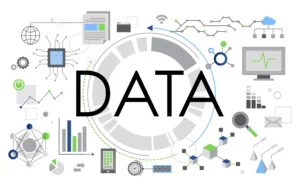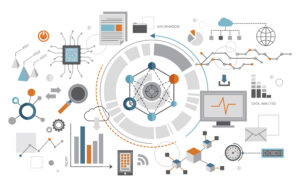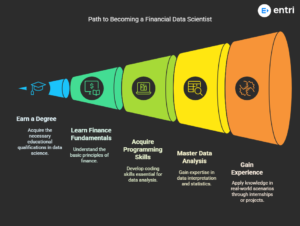Table of Contents
Who would have thought that there would be a thing called ‘fintech’? The combination of these industries- finance & technology- doesn’t seem to be right? Yet, we are living in a world where it is an existing entity and not a possibility. The traditional thought of finance and technology being related to money and machines, respectively, is an expired one. With technology, the possibilities are endless!
This blog specifically discusses how do you become a culmination of these two industries, or rather, how do you become a data scientist in the fintech industry. Keep reading to gain exciting insights as well! We hope that you would be searching for fintech data scientist jobs in the near future!
Check out this video by Entri in Malayalam!
Introduction: What is Fintech and the role of a Data Scientist?
Let us warm you up with an introduction into fintech! Fintech = financial technology. How do they come together? Well, technology is used by the finance industry to provide financial services or enhance the way financial processes usually take place. This can include mobile payment apps, trading apps, cryptocurrency platforms, etc. Paytm, Google Pay, Phonepe, etc. are examples in this manner. It’s easy to understand, right?
Now, how does a data scientist come into this picture, or to phrase it better, what is the role of a data scientist in fintech? The fintech industry is bound to receive tons of data, including transactional history, user preferences, market trends, etc. This is where the data scientists come into the picture. Fintech companies are dependant on data scientists to identify patterns, predict future trends, detect fraud, and make smarter and better decisions by analysing the data.
Also read: What is Data Science – Definition, Applications
Understanding the Fintech Landscape
1: Which of the following algorithms is most suitable for classification tasks?
Before we jump into the specifics of becoming a fintech data scientist, let us venture into the dynamics and aspects of the fintech landscape. Fintech has actually grown into a broad and vast term, with various sectors thriving due to technology under its shadow. Some of the crucial sectors where data science plays a vital role are listed below.
- Payment: As stated above, payment apps like Paytm, Google Pay, Phonepe, etc. have made it easier to send and receive money seamlessly, due to data scientists who are responsible for optimising the transactions.
- Lending: Money lending apps have also seen a spike in popularity in India. Apps like Slice and LazyPay have revolutionised personal loans due to data scientists building credit score models that decide whether the user is eligible for loans or not.
- Blockchain & Cryptocurrency: Blockchain technology actually powers the digital currencies that are available in the market right now. Examples include Ethereum and Bitcoin. Data scientists are tasked with analysing transaction data and then build models to predict market trends.
- Insurtech: Insurance apps like Acko and Policybazaar are a testament as to how insurance companies are going digital. Data scientists help the insurer to understand the risks, predict claims, and personalise insurance plans for customers.
Also read: What is Data Science Course Fee?
🚀 Start Coding Today! Enroll Now with Easy EMI Options. 💳✨
Equip yourself with in-demand skills to land top-tier roles in the data-driven world.
Start Learning Now with EMI OptionsEssential Skills for Data Scientists in Fintech
Now let us dive into the skills required by a data scientist in fintech. Skills may differ according to the organisation or the requirements. However, the common skills that are required are as follows:
- Have an understanding and the ability to be comfortable with python, R, and SQL.
- Machine learning and AI, as it helps in making predictions based on data. For example, insurtech utilises analysis and prediction of data by data scientists to detect fraudsters and loan defaulters.
- Handling data calls for a strong understanding of statistics including topics like regression, hypothesis testing, and probability.
- Having skills that can handle big data like Hadoop and Spark is necessary as fintech deals with huge amounts of data on a daily basis.
- One of data scientist’s major role is to interpret the data and present it in a comprehensive manner to the decision-makers. Knowledge of data visualisation tools like Tableau, PowerBI, and Python libraries like Matplotlib and Seaborn is a must in this field.
- Finally, having a strong understanding of the finance is a must. That, goes without saying, as you will be handling data that is directly related to finance. Without knowing the ins and outs, you won’t be able to interpret data efficiently.
Also read: Data Science Syllabus and Notes
Educational prerequisites
Becoming a fintech data scientist doesn’t mean that you have to learn data science from the beginning. Most individuals cultivate an interest in the field and then stumble upon the possibility of venturing into sectors like fintech. In that aspect, you can learn about data science from anywhere. Here are some of the resources that you can use while preparing for your career.
- Degrees: While there’s no strict requirement to have a degree to become a data scientist, most of them have a background in computer science, data science, statistics, finance, or economics. Having a Master’s or a PhD in the related field can give you an edge.
- If you have already earned a degree, but want a transition towards data science or fintech, consider certifications. Many online platforms offer courses tailored to data science and fintech. Some of the most popular certifications include:
-
Google’s Data Analytics Professional Certificate
-
IBM Data Science Professional Certificate
-
Microsoft Certified: Data Scientist Associate
-
- You can also try fintech specialisations like financial engineering, quantitative analysis, or algorithmic trading.
Also read: What is a Data Science Pipeline? Ultimate Guide
Financial Data Scientist Salary
Annual salaries for financial data scientists in the United States range from $112,000 to $168,000, with an average salary of $140,000. Financial data scientist salaries in India range from 500,000 to 3,500,000 with an average annual salary of 1,240,000.
Several factors affect the salary outlook for financial data scientists. For example, experience and expertise play an important role, and experienced professionals often command higher salaries. Geographical location is also important, as salaries are higher in financial centres such as New York and London. Certain industries and employers, such as investment firms and fintech start-ups, can also influence compensation. The increased ability to make financial decisions and address regulatory requirements will increase the demand for financial data scientists and make salaries in the field more competitive.
Also read: Data Science Salary Trends in Kerala
🚀 Start Coding Today! Enroll Now with Easy EMI Options. 💳✨
Equip yourself with in-demand skills to land top-tier roles in the data-driven world.
Start Learning Now with EMI OptionsHow Data Science is Used in Fintech?
Data science is becoming a trend in various fintech industries because it can quickly solve various business problems. The most common uses in the fintech industry are:
1. Fraud Detection
Because fraud detection is so important to financial institutions, they are constantly looking for fraud prevention tools and ways to automate risk management. Different types of scams attempt to imitate, steal or execute money laundering schemes. Effective fraud prevention tools require prevention, protection and reporting systems. Data warehouses receive data from payment processing systems and feed it into models to generate real-time results. Data science when scanning fintech organizations can also help define fraud collaboration patterns and create interactive charts and graphs. To learn more about fraud detection using live courses, see Applied Data Science with Python.
2. Customer Behaviour Analysis
Deep learning about customer behavior enables real-time user segmentation, customer behavior modeling and predictive analytics. BI tools allow you to visualize the financial activities of your users in your digital banking ecosystem. Statistics on users’ financial behavior help fintech organizations to develop product strategies. Another metric that data scientists can provide to fintechs is customer lifetime value (CLV). It is a prediction of all the benefits that a company derives from its relationship with its customers.
3. Risk Analysis
Risk modelling systems help determine whether a user is trustworthy and has access to additional services, higher cash credits, and lower rates. Data scientists can build models based on product usage and open source data from various sources.
4. Product Improvement
Product improvement strategies can be created based on product usage analysis and market information. Data scientists can model and predict functional changes in customer behavior and response to fintech product changes.
5. Process Improvement
Process improvement can be based on the use of digital twin approaches, a recent trend in product development. Financial institutions and digital banks can monitor and analyze offline customer support and operational process metrics to simulate changes and assess future impacts. particle for direct object
6. Personalized Marketing
Personal marketing is one of the most powerful tools for promoting fintech products. Data science makes it possible to analyze user behavior patterns and offer relevant financial products and services to users. particle for direct object
Other applications of data science in the fintech industry include real-time analytics, consumer analytics, algorithmic trading, robo-advisors, and financial planning.
These use cases drive a lot of fintech data science careers, so check out the best data science bootcamps to become a data science career.
Also read: What is the Scope for Data Science in Kerala
How To Become A Financial Data Scientist?
Being a financial data scientist is an exciting career path that combines financial expertise with data analysis skills to decipher the complex world of finance. But how do you get started on this journey? Check out our roadmap that guides you through the key steps and skills you need to succeed as a financial data scientist.
1. Earn A Financial Data Scientist Degree
The first step to building a career as a financial data scientist is to earn a bachelor’s degree in a related field such as finance, economics, mathematics, statistics, computer science, or engineering. These areas provide the foundational knowledge to understand financial concepts and develop analytical skills. You should also focus on subjects related to finance, statistics and programming to lay the foundation for your future career. A solid educational foundation serves as a foundation for building more advanced skills and expertise in financial data science.
2. Learn The Fundamentals Of Finance
To become an effective financial data scientist, it is important to learn the fundamentals of finance. You should learn about investment theory, financial markets, risk management and financial products. Understanding these concepts is essential because they form the basis of analyzing and interpreting financial data.
For example, when analyzing stock market data, knowledge of investment theory can help you evaluate the performance of various assets and design portfolio optimization strategies. Understanding risk management is key to assessing and mitigating financial risks using data science solutions.
In addition, financial data scientists often work closely with financial experts, and a clear understanding of finance enables effective communication and collaboration. By bridging the gap between finance and data science, you can provide valuable insights, make accurate forecasts, and help make smarter financial decisions within your organization. These basic financial skills will help you interpret financial data and achieve more meaningful results as a financial data scientist.
3. Acquire Programming Skills
Financial data scientists must develop programming skills, especially in languages such as Python and R. These skills are critical because they allow you to efficiently manipulate and analyze large amounts of financial data. . Python and R provide powerful libraries and tools for data cleaning, machine learning, and statistical analysis that are essential for analyzing financial data. You can use online resources, tutorials and books to learn these programming languages. You will also work on Python and R projects and be proficient in using these languages to tackle various data science challenges.
Master programming skills to automate tasks, build models for risk assessment and portfolio optimization, and build robust financial applications. If you are good at programming, you can also develop algorithmic trading systems and custom financial software.
4. Mastering Data Analysis And Statistics
Learning data analysis and statistics is essential to success as a financial data scientist. To master these topics, you should consider specialized courses, online training, or obtaining a degree in data analysis or statistics. To effectively analyze financial data, these subjects equip you with the tools and approaches.
Data analysis and statistics are important to this role as they form the basis of data-driven decision making. You should be skilled in data collection, cleaning, interpretation, statistical modeling and hypothesis testing. These skills allow you to extract valuable insights from financial data, build predictive models of market trends, and evaluate the statistical significance of your results.
5. Gain Practical Experience
Gaining work experience is essential to becoming a skilled financial data scientist. You should be looking for internships, entry-level positions, or freelance job opportunities in finance, data analytics, or related fields. To real-world financial data and problems, to apply your knowledge and skills .
Working on real-world financial data science projects through platforms like GitHub and ProjectPro is invaluable. These hands-on experiences provide you with the opportunity to tackle complex financial challenges, strengthen your analytical skills and techniques, and build a portfolio of practical work.
Practical experience is very important because it bridges the gap between theory and application. It will help you sharpen your data analysis skills, understand complex financial data sets, and develop the problem-solving abilities necessary to become an effective financial data scientist.
6. Building A Portfolio Of Financial Data Science Projects
Building a portfolio is critical to success as a financial data scientist. You can create one by participating in a personal data science project or by participating in a financial data analysis competition. You should document your work, including the problem statement, datasets used, techniques applied, and insights gained. You can create your portfolio in GitHub to store your code.
A portfolio is important in your career roadmap because it showcases your skills and expertise. It demonstrates your ability to process real-world financial data, make data-driven decisions, and provide actionable insights. Employers and potential clients can review your portfolio and assess your problem-solving skills. It’s a valuable tool to showcase your work experience and differentiate yourself in the competitive field of financial data science.
7. Networking With Industry Experts
Networking with industry experts is essential to stay up-to-date on industry trends and career opportunities and to gain insight into financial data science. This can also lead to valuable career opportunities and collaborations. You should join financial and data science communities online and offline. You should attend industry conferences, webinars and seminars to network with experts in your field. You need to create a strong professional presence on LinkedIn and showcase your skills and interests. Join relevant discussions and connect with financial data science experts. You should also tap into your educational networks and previous colleagues who may have industry insights and connections. Also, don’t hesitate to contact a professional for informational interviews or coaching opportunities.
8. Start Applying For Entry-Level Financial Data Science Roles
The final step in this roadmap is to apply for a Junior Financial Data Scientist role in your organization. If you’re applying for a financial data scientist role, you should create a customized resume and cover letter that highlights your education, skills, work experience, and portfolio. You should tailor your application to the job requirements and highlight how your background matches the requirements of the role. It’s important to secure a position that allows you to leverage your finance and data science expertise. These roles allow you to work directly with financial data, build data science models, and make data-driven decisions that impact investment strategy, risk management, and financial operations. Applying for a position like this is essential to start your career and make a positive contribution to the financial industry.
9.Take a Data Scientist Course
Data science courses are in high demand in the market. According to the history of data science, data science has created numerous job opportunities with different functions in different applications. Data science is a discipline that deals with extracting insights and information from data. Simply put, it is a way of making sense of large amounts of data and using it to make decisions and make predictions. The goal of data science is to extract insights from data to make predictive decisions. It is expanding rapidly and performs important functions in many fields.
Tools Used⚙️
Becoming a data scientist in the fintech industry would definitely expose you to a lot of tools and technologies. The smart way in this situation is to familiarise yourself with a lot of the tools beforehand. Here are the most commonly used tools in the fintech industry by data scientists.
- Python libraries like Pandas, NumPy, and Scikit-learn.
- Big data platforms like Hadoop and Spark.
- Cloud platforms like AWS, Google Cloud, and Microsoft Azure.
Also read: Top 100 Data Science Interview Questions and Answers
Key Challenges in Fintech Data Science
Professional challenges are what makes great careers. The will and determination to overcome challenges, define you and your character as a data scientist. The challenges are a set of their own in the fintech industry. Here are some of the common challenges faced by fintech data scientists:
- Financial data is often messy and unstructured, meaning that you would have to spend a lot of time cleaning and organising data.
- Apart form being messy, financial data is sensitive as it holds all the transactional information of users that will be exploited if it falls into the wrong hands. Data scientists have to ensure data privacy and security.
- Due to the heavy risks and frauds that accompany in the financial industry, it is normal to have an abundance of regulations. Knowledge of these regulations would be beneficial as the models created by data scientists have to comply with those regulations.
Conclusion: Your Path to Becoming a Data Scientist in Fintech
An overview of the key information you need to become a fintech data scientist shows that you need a comprehensive skill set. For example, your expertise in fintech and data modelling could qualify you for a fintech data scientist job. It also requires expertise in data manipulation and many other non-technical skills. One of the main reasons to pursue a career in fintech data science reflects the long-term growth potential of fintech.
Over time, data science has become one of the main components of the fintech industry. As the fintech industry continues to generate massive amounts of data every second, data science professionals are needed. Learn about fintech data scientists and training resources to become a fintech data scientist today. If you feel like learning more about data science, you can check out Entri’s data science course, to kickstart your journey as a data scientist in the fintech industry! Enrol now and start your career!
| Related Articles | |
| Best Data Science Skills | Machine Learning Basics |
| EDA Steps, Importance | EDA Techniques |
| Data Analysis | Importance of Data Preprocessing in ML |
🚀 Start Coding Today! Enroll Now with Easy EMI Options. 💳✨
Equip yourself with in-demand skills to land top-tier roles in the data-driven world.
Start Learning Now with EMI OptionsFrequently Asked Questions
What is a FinTech data scientist?
Does finance use data science?
Yes financial institutes use data science to know their customer better and to avoid fraud.
Is coding required for FinTech?
Yes. Coding is required to become data scientist in any domain.


















